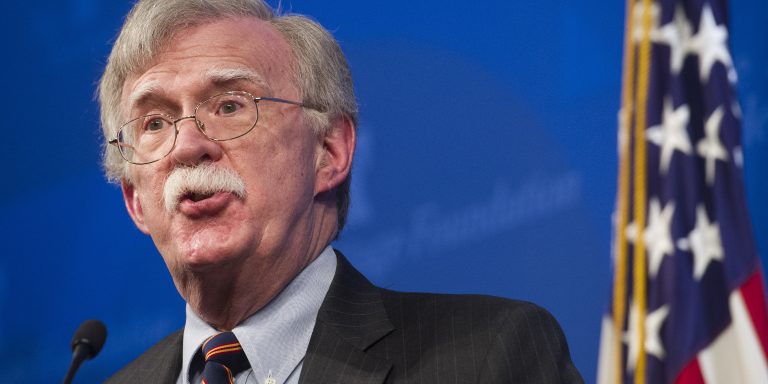INTELBRIEF
January 4, 2019
IntelBrief: The New Africa Strategy: Countering Chinese Influence on the Continent

- On December 13, 2018, U.S. National Security Advisor John Bolton detailed the Trump administration’s New Africa Strategy.
- The strategy seeks to counter Chinese influence on the continent and promote U.S. national security interests.
- In recent years, Chinese investment in Africa has grown exponentially, and the continent remains a vital partner for Beijing to expand its influence abroad.
- Although several points raised in the strategy are valid, overall, it remains a flawed approach to countering American adversaries in Africa.
.
.On December 13, 2018, National Security Advisor John Bolton presented the Trump administration's New Africa Strategy. Bolton described the strategy as reflecting 'the core tenets of President Trump's foreign policy doctrine' and remaining 'true to [Trump's] central campaign promise to put the interests of the American People first.' The strategy was unveiled right around the time Trump announced the withdrawal of troops from Syria and may signal a U.S. pivot toward Africa. The strategy addresses three core U.S. national security interests on the African continent: i) advancing trade between the U.S. and African states ii) countering the threat from ’Radical Islamic Terrorism’ and violent conflict iii) ensuring the efficient use of humanitarian and economic assistance. Bolton also attacked the inefficiency of U.N. peacekeeping missions in Africa and accused China and Russia of ‘predatory’ practices. Mentioning China 17 times during the rollout of the strategy, it is evident that the New Africa Strategy is a means of countering Beijing’s interests on the continent.
Over the past decade, Sino-African economic ties have deepened in tandem with China’s economic progress. Investment in Africa is part of the ‘going out’ (???) or 'going global' strategy for Chinese companies developed in the 1990s, which feeds into Deng Xiaoping's more comprehensive program of economic reforms introduced in the 1980s. For China, the African continent presents opportunities across several sectors that are vital to sustaining rapid industrialization and urbanization: energy, natural resources, agriculture, and trade. In 2009, China surpassed the United States as Africa’s biggest trading partner and is now ranked first on the continent in categories such as investment growth and infrastructure financing. In Africa, the U.S. still leads in the spheres of investment stocks and aid. Nigeria, Ethiopia, and Angola represent the largest Chinese investment partners. During the 2018 Forum on China-Africa Cooperation (FOCAC), Chinese president Xi Jinping pledged $60 billion for Africa, with $5 billion going to Nigeria. In Africa, Chinese investment is primarily concentrated in the transport and energy sectors.
Chinese investment strategies in Africa, and across the globe through the Belt and Road Initiative, have been heavily criticized for entrapping developing countries in massive debts and infringing upon national sovereignty. Bolton cited the growing debt crisis in Zambia and Djibouti, which has resulted in China collecting on the debt through the acquisition of land and critical infrastructure. One of the most notable examples in Africa includes building the first overseas Chinese military base in Djibouti in 2017. Indeed, these trends are worrisome, as they undermine the agency of developing states in need of investment while simultaneously endangering U.S. national security interests—concerns also raised by the national security advisor during his remarks. Beijing’s practices in Africa also call in to question China’s pursuit of hegemony beyond its traditional sphere of influence. If the Belt and Road Initiative is merely an economic policy geared toward ‘win-win’ cooperation, why would it require China to build a military base in Djibouti? Still, there have been several prominent cases where African nations have denied loans and investment opportunities from China on the basis of being unsustainable, including Sierra Leone in 2018, Chad in 2011, and Namibia in 2016.
Bolton raises some valid points, such as the need for supporting African agency, countering terrorism, and the many ethical, societal, security, and environmental implications of an increased Chinese and Russian presence on the continent. The New Africa Strategy, however, is deeply flawed when it comes to advancing American interests by countering Chinese influence through engagement with African states. First, the inflammatory language and zero-sum mentality exhibited by Bolton and the Trump administration have previously shown to be counterproductive with Beijing. Second, abandoning support for the U.N. peacekeeping mission in Africa signals to the world that the U.S. is forsaking multilateralism. China is currently the largest provider of troops to U.N. peacekeeping missions, and this represents yet another instance of Trump abandoning global leadership and China stepping up to fill the void. Third, the strategy is exclusively reactionary to Beijing’s policies—U.S. foreign policy should not be formulated solely in response to Chinese actions.
In the long-term, U.S. foreign policy should focus on the reforms necessary for American-led international institutions to remain relevant and more efficient, strengthen the U.S. alliance system and champion an enduring commitment to liberal democratic values. The U.S. must enhance efforts to showcase the desirability of choosing a partnership with Washington over Beijing. In sum, abandoning multilateralism and escalating great-power competition is not the answer to advancing U.S. national security interests in Africa.
.
For tailored research and analysis, please contact: info@thesoufancenter.org
[video width="960" height="540" mp4="https://thesoufancenter.org/wp-content/uploads/2019/01/IB-0104.mp4" poster="https://thesoufancenter.org/wp-content/uploads/2019/01/AP_18347594993006.jpg"][/video]